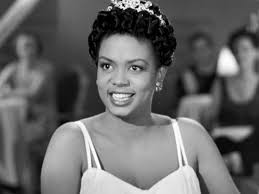One day, we’re told, a Juilliard professor heard something upsetting.
Someone was performing an adjusted version of a classic. He stomped in, asking who dared to edit Rachmaninoff.
He found Hazel Scott, age 8, at the piano. She had made changes because her hands weren’t yet big enough for some of the moves.
Scott (shown here) would soon become Juilliard’s youngest student. And, in her teens, the youngest performer at the elegant Cafe Society. And, at 22, the spark for a brief movie strike. And, later, a star on TV and in Paris.
That’s told in a fascinating “American Masters,” at 9 p.m. Friday (Feb. 21) on PBS. Add an “American Experience” profile of Walter White (9-11 p.m. Tuesday, Feb. 25) and you have a strong finish to Black History Month.
The month started well, with Henry Louis Gates’ three-part look at the migration to the North. It stumbled with a Chautauqua/Wynton Marsalis hour that had too much repetitive talk and too little music. Now it bounces back.
White – who guided the NAACP for 25 tempestuous years — and Scott were giant figures in U.S. history, but then were mostly forgotten. Now they’ve been resurrected; that’s what PBS is for.
By the time Scott and her mother arrived from Trinidad, she was (at about 4) a piano prodigy, performing in public. She honed her skill at Juilliard and at Cafe Society, where her friend Billie Holiday starred. When Holiday left, she became the star, a gifted, teen singer and pianist.
Then came musical bits in movies. Before a big going-off-to-war number, Scott, then 22, noticed that the Black actresses were given soiled skirts. They would never do that, she said, while saying goodbye to their men.
A three-day strike began. The studio relented and brought out clean skirts … but never hired her again.
Not to worry: There were more triumphs and troubles ahead.
She toured, insisting the theaters not have segregated seating. “It was her own civil-rights movement,” actress-singer Tracie Thoms says in the film.
(Indeed, Martin Luther King, Jr., said the first time he ever sat in a non-segregated theater was for a Hazel Scott concert.)
At 29, she started a weekly half-hour TV show on the DuMont network – no guests, just Scott playing and singing. Then one source listed her as a Communist sympathizer.
Scott – “nothing if not sure of herself,” one person says – asked to appear before the House Un-American Activities Committee, where she said she had zero Communist involvement.
Still, the attention made sponsors nervous. Her show was canceled.
Scott remained outspoken. “I have a terrible temper,” she said.“And I make a very poor doormat.”
She would find someone who matched that – Adam Clayton Powell, Jr., the charismatic congressman. Their romance was controversial (he was married at the time) and their marriage had strong wills collide.
Scott found joy performing in France. Their son, Adam Clayton Powell III, recalls the moment his dad said: “Son, I don’t think that your mother is coming home.”
When she did, the civil rights movement was thriving. Scott did a few television roles, did concerts, landed was she called “my dream job” at a Manhattan nightclub … and then learned she had cancer.
She died in 1981, at 61. “She was able to live life out loud,” Thoms says.
So was Walter White. Then the world seemed to forget them; fortunately, PBS didn’t.

A life lived out loud — and on camera
One day, we’re told, a Juilliard professor heard something upsetting.
Someone was performing an adjusted version of a classic. He stomped in, asking who dared to edit Rachmaninoff.
He found Hazel Scott, age 8, at the piano. She had made changes because her hands weren’t yet big enough for some of the moves.
Scott (shown here) would soon become Juilliard’s youngest student. And, in her teens, the youngest performer at the elegant Cafe Society. And, at 22, the spark for a brief movie strike. And, later, a star on TV and in Paris.
That’s told in a fascinating “American Masters,” at 9 p.m. Friday (Feb. 21) on PBS. Add an “American Experience” profile of Walter White (9-11 p.m. Tuesday, Feb. 25) and you have a strong finish to Black History Month. Read more…